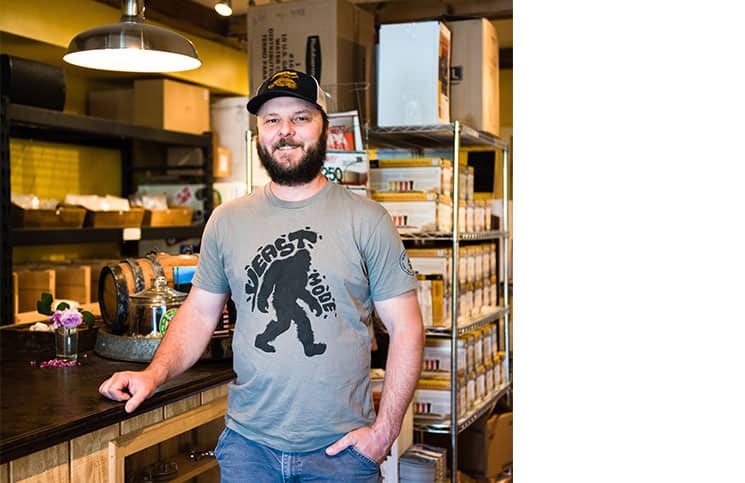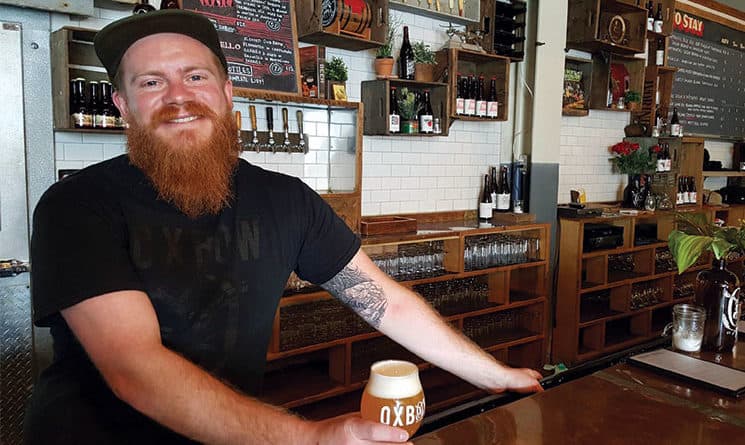Have you ever noticed that the beer at some dive bars tastes… buttery? That’s the big swig of lactobacillus you just drank from dirty tap lines. And “cheese” should never be a tasting note in an IPA, or any other beer for that matter. It usually means the brewer used old hops.
Maybe ignorance really is bliss. Or maybe it’s just the gateway to mediocre beer.
That simple idea is the founding principle of the Cicerone Certification Program. Since its young existence started in 2008, Cicerone has simultaneously churned out servers trained in best beer-service practices and cherry picked a handful of top beer professionals that are being compared with the Master Sommeliers of the wine world.
Earlier this year, Jack Van Paepeghem of Oxbow Brewing Company in Portland, Maine, became one of just six people to earn Cicerone’s Advanced certification, and the only person from New England to reach that elite level. Today, there are eight Advanced and 12 Masters — the highest achievement in Cicerone.
“(I was drawn to) the personal challenge of it, driving myself to know more and be better and be more experienced with beer in general,” Van Paepeghem said.
The new sommelier
The Cicerone Certification Program was started by Ray Daniels, a Chicago-based brewer, beer judge, and writer with a résumé too long to list. Daniels didn’t come up with the idea for beer certifications. There have been many others, including the reputable Master Brewers Association Beer Steward Certificate and Doemens Bier Sommelier. Beginning in the fall of 2017, the University of New Hampshire will begin offering a professional development certificate program for aspiring brewers.
Still, Cicerone has become the go-to for many beer professionals, especially those who may not be brewers themselves.
“It is a baseline standard for the industry,” Van Paepeghem said. “If there is somebody there with a second or higher level certification, you know you are going to get quality beer.”
Daniels has often been quoted saying that he started the Cicerone program simply because he was sick of being served bad beer. Sometimes it is the fault of the brewer, but it can also be due to dirty draft lines, incorrect glassware, or an inexperienced server.
“… it comes down to being able to memorize eight pages on the origin of pilsner, what the color should be, and other intricate details.”
— Sean Jansen of the New Hampshire Craft Alliance
Cicerone currently has four levels: Certified Beer Server, Certified Cicerone, Advanced, and Master. Sixty-nine bucks and a 75-percent score on an online exam will get you past the first level, which mostly focuses on proper beer service and general knowledge of beer styles. More than 67,000 people have attained this certification.
The real props come with the second level, where the pool drops to fewer than 2,400 Certified Cicerones. In addition to a written exam, the second level includes a tasting portion that requires identifying flawed beers. The Cicerone website recommends preparing for this exam for over a year after reaching the initial certification level. Only about one-third of applicants will pass.
“It can be easy to be a super taster,” said Sean Jansen, craft brand manager for the New Hampshire Craft Alliance. “You can say, ‘I can tell you what this is, I have brewed with this hop before.’ But then it comes down to being able to memorize eight pages on the origin of pilsner, what the color should be, and other intricate details.”
After that, it only gets more intense. The Advanced level exam takes a full day. Exam questions are considerably more difficult, and the flaws that need to be distinguished are more nuanced.
The Master level exam takes two days and most do not pass. The test requires encyclopedic knowledge about topics like draft systems and food pairings. If participants aren’t already nervous, they have to demonstrate a mastery of taste buds and beer knowledge in conversation with the nation’s top beer professionals.
Van Paepeghem narrowly missed passing the Master exam on his first try. He passed the Advanced level in one attempt.
Not the final word
Breweries typically don’t rely on certifications to define the elite. Many in the industry have proven their skills, with or without a test.
“I think certification programs play a big role but aren’t always necessary, because so many people have been in the craft beer world for so long that they simply don’t need the certification,” Van Paepeghem said.
Cicerone may be the most valuable for those directly facing the consumer, such as bartenders, servers, and distributors who sell beer to restaurants.
“Where the opportunity exists right now is bringing more and more people into our craft beer culture and community,” said Sean Sullivan, executive director of the Maine Brewers’ Guild. “The only way to do that is having a quick answer or response to somebody who says, ‘I don’t like beer’ … or to explain why (a bar) should have two IPAs on tap. These are the people who can help grow our market and are the critical players right now.”

Alex McDonald, co-owner of A&G Homebrew Supply and Earth Eagle Brewings in Portsmouth, does not require his employees to be certified, but does make sure they know how to talk about beer. photo by Anna Solo
Alex McDonald, co-owner of A&G Homebrew Supply and Earth Eagle Brewings, both in Portsmouth, said he doesn’t believe any of his employees have completed a certification program, and he wouldn’t require it for employment. He does use the standards outlined in the Beer Judge Certification Program, which is dedicated to homebrews, when brewing his beers. But he mainly relies on in-house training whenever a new beer comes on tap.
“We explain the style or interpretation of the style and ingredients so they are educated on the flavor profile and aromatics,” McDonald said. “We have a lot of unique flavors on the board, and they have to have an idea of how to explain the beer.”
And it’s working. When asked to name a few places in the Seacoast who are doing beer right, Van Paepeghem pointed to Earth Eagle.
“They have technically difficult beers and do a great job telling the story behind the beer,” he said.
All this focus on quality means beer professionals are pushed to do better, which hopefully also means better beer for the rest of us. But there is a downside.
“It ruins your drinking experience in everyday life,” Van Paepeghem said. “There is a lot of bad beer out there that people aren’t really aware of.”

